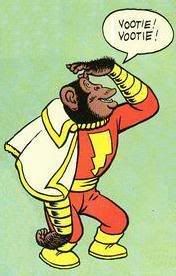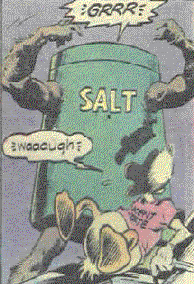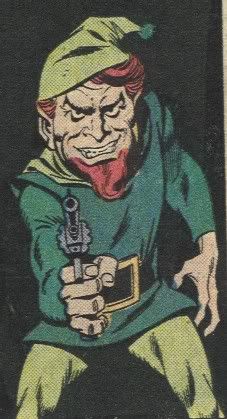Two Plus Two Does Not Equal Four Thousand, Nine Hundred and Twelve: A Partial Defense of Mark Millar and Civil War
Mark Millar and Marvel editorial painted themselves into a wicked corner with the Civil War miniseries. They announced their intentions to both approach the issues of the day and to give the differing sides an equal hearing. Online critics have been blasting them for failing to live up to this goal of even-handedness.
In Millar's defense, that has to be tough.
Not in terms of the “Superhuman Registration Act,” the core of the comic story. Looked at in a vacuum, there are many good arguments to make on both sides of the Act, and the story could be a rich exploration of the politics of a science-fictiony universe. The Marvel Universe would be pulled in a different direction, and characters would be pushed and pulled in directions that they’d never seen before.
However, that’s not what Marvel is doing, now is it?
The motivator behind Civil War (aside from sales, of course) is dealing with the political issues of the real world, not their fictional one. The entire series is, as we’re all well aware, a hamfisted allegory of the struggles between civil liberties and security in America. As is the case of so many badly-written stories in serial fiction, the writer had a story he wanted to tell, and crammed pre-existing characters and situations into that story, deforming and distorting those characters to say what he wants to say. The goal was to interpret real-world events through fictional-world constructs.
In the real world, the split between sides of the issue is difficult to approach with even hands.
One side argues that the threat of terrorism is real, and that to fight it requires that it be pursued vigorously while maintaining a sense of proportion. They argue that if we could maintain our civil liberties in the face of a nuclear-armed Soviet Union, surely we could maintain them in the face of a dork whose plan was to stuff explosives in his sneakers. This side argues that the threats to our safety lie not only with bombers, but also in our own fears, and that courage and responsibility in the face of terror is the only valid response.
The other side is a combination of shrieking hysterics and power consolidation. Insisting that a handful of tragic bombings and terrorist acts have created a paradigm shift in human history, they support secret prisons, the suspension of basic legal protections for individuals, and the suppression of dissent. We must trust our leaders to do the right thing without oversight, because dammit, they said so. This side argues that the threats to our safety lie with both a unified army of shadowy operatives in far-away lands and with the countless quislings at home who would open the gates of America to let the terrorists run rampant, because, well, because they’re spineless traitors or something.
(Thankfully, the latter side is small and largely confined to the White House and Fox News. Finding a regular citizen of any political persuasion who takes that side anymore is a tough one. Honestly, I’m not sure if even the White House believes it.)
When Millar wrote his story, he was confronted with a significant problem. How does one present the sides even-handedly when one side argues for courage, steadfastness, and getting the job done, and the other side screams “AAAAAH!!!! DO ANYTHING!!!! FREEDOM BE DAMNED, I DON’T CARE!! ROUND UP SCARY-LOOKING PEOPLE BEFORE I WET MYSELF AGAIN!!!!! AAAAAHHH!!! DO ANYTHING YOU WANT, JUST LET ME BE SAFE!!!!”
The Civil War storyline begins with a tragedy that leads to hundreds of deaths. A group of concerned governmental-types exploit this tragedy to enact legislation they’ve desired for years. That this new legislation happens to increase their own personal power, well, that’s just a happy side-effect of Making America Safer, now isn’t it? That the legislation is both of dubious effectiveness and questionable legality, well, that’s not as important as rallying behind it, right?
Yeah, that’s not a direct comment on modern America or nothin’.
How can one present this situation and “be fair to both sides?” When one side argues that two plus two equals four, and the other argues that two plus two equals nine thousand eight hundred and twenty, should one tell a story where two plus two equals four thousand nine hundred and twelve and call it “fair?”
And thus we are led to Civil War, where Millar resorts to the only sense of even-handedness that one can have in such situations: page count. The sides do have equal time to express themselves.
If one side happens to express itself by creating killer clones and recruiting armies of violent psychopaths to accomplish its ends, so be it. In the real world, its counterpart side has declared checks on executive power as outdated, rejected the long-held and carefully-crafted structure of law as an enemy of security, and exploded with outrage when its program of secret prisons was exposed. It’s hard to paint that as other than exploitive power-hunger at its worst.
Granted, were I in Millar’s shoes, or those of Marvel editorial, I would never have told the story in this fashion. Men in multicolored tights punching each other out can indeed tell allegorical tales, but they tend not to be the subtlest of fictional creations. To force these characters into stories that violate their long-standing appeal is wrongheaded and makes for bad comics, and moreover, it ends up making weird, simpleminded, and confused comments on the actual events.
Real-world issues tend to be complex and lacking in absolute clarity. Comic books revolve around men and women in primary-colored tights kicking each other in the head. "Exploration of complex political issues" and "boot-to-head make-with-the-explodo four-color action" are difficult to reconcile. Politics in superhero books isn't, and I'd argue can't be, much more complex than what you'd find on a bumper sticker.
I suppose the inclusion of sophisticated politics could be done well, but I can't think of a place where it actually has been. No, I don't read Ex Machina.
("Politics are complex and lacking in clarity" is a notion that runs counter to the spirit of this post, I know. Generally, my political thinking is filled with caveats and conditionals, but some issues are simpler than others. Plus, you'll have to excuse me, I'm ranting today.)
All that being said, if you’re gonna hew to the real-world parallels and political relevance, “balance” can’t be done at the cost of reality. Millar understands that two plus two does not equal four thousand nine hundred and twelve, and that calling people traitors for pointing it out doesn’t change the facts.
Civil War isn’t much fun or a comic I’d recommend to anyone. But I can see where it’s coming from.
In Millar's defense, that has to be tough.
Not in terms of the “Superhuman Registration Act,” the core of the comic story. Looked at in a vacuum, there are many good arguments to make on both sides of the Act, and the story could be a rich exploration of the politics of a science-fictiony universe. The Marvel Universe would be pulled in a different direction, and characters would be pushed and pulled in directions that they’d never seen before.
However, that’s not what Marvel is doing, now is it?
The motivator behind Civil War (aside from sales, of course) is dealing with the political issues of the real world, not their fictional one. The entire series is, as we’re all well aware, a hamfisted allegory of the struggles between civil liberties and security in America. As is the case of so many badly-written stories in serial fiction, the writer had a story he wanted to tell, and crammed pre-existing characters and situations into that story, deforming and distorting those characters to say what he wants to say. The goal was to interpret real-world events through fictional-world constructs.
In the real world, the split between sides of the issue is difficult to approach with even hands.
One side argues that the threat of terrorism is real, and that to fight it requires that it be pursued vigorously while maintaining a sense of proportion. They argue that if we could maintain our civil liberties in the face of a nuclear-armed Soviet Union, surely we could maintain them in the face of a dork whose plan was to stuff explosives in his sneakers. This side argues that the threats to our safety lie not only with bombers, but also in our own fears, and that courage and responsibility in the face of terror is the only valid response.
The other side is a combination of shrieking hysterics and power consolidation. Insisting that a handful of tragic bombings and terrorist acts have created a paradigm shift in human history, they support secret prisons, the suspension of basic legal protections for individuals, and the suppression of dissent. We must trust our leaders to do the right thing without oversight, because dammit, they said so. This side argues that the threats to our safety lie with both a unified army of shadowy operatives in far-away lands and with the countless quislings at home who would open the gates of America to let the terrorists run rampant, because, well, because they’re spineless traitors or something.
(Thankfully, the latter side is small and largely confined to the White House and Fox News. Finding a regular citizen of any political persuasion who takes that side anymore is a tough one. Honestly, I’m not sure if even the White House believes it.)
When Millar wrote his story, he was confronted with a significant problem. How does one present the sides even-handedly when one side argues for courage, steadfastness, and getting the job done, and the other side screams “AAAAAH!!!! DO ANYTHING!!!! FREEDOM BE DAMNED, I DON’T CARE!! ROUND UP SCARY-LOOKING PEOPLE BEFORE I WET MYSELF AGAIN!!!!! AAAAAHHH!!! DO ANYTHING YOU WANT, JUST LET ME BE SAFE!!!!”
The Civil War storyline begins with a tragedy that leads to hundreds of deaths. A group of concerned governmental-types exploit this tragedy to enact legislation they’ve desired for years. That this new legislation happens to increase their own personal power, well, that’s just a happy side-effect of Making America Safer, now isn’t it? That the legislation is both of dubious effectiveness and questionable legality, well, that’s not as important as rallying behind it, right?
Yeah, that’s not a direct comment on modern America or nothin’.
How can one present this situation and “be fair to both sides?” When one side argues that two plus two equals four, and the other argues that two plus two equals nine thousand eight hundred and twenty, should one tell a story where two plus two equals four thousand nine hundred and twelve and call it “fair?”
And thus we are led to Civil War, where Millar resorts to the only sense of even-handedness that one can have in such situations: page count. The sides do have equal time to express themselves.
If one side happens to express itself by creating killer clones and recruiting armies of violent psychopaths to accomplish its ends, so be it. In the real world, its counterpart side has declared checks on executive power as outdated, rejected the long-held and carefully-crafted structure of law as an enemy of security, and exploded with outrage when its program of secret prisons was exposed. It’s hard to paint that as other than exploitive power-hunger at its worst.
Granted, were I in Millar’s shoes, or those of Marvel editorial, I would never have told the story in this fashion. Men in multicolored tights punching each other out can indeed tell allegorical tales, but they tend not to be the subtlest of fictional creations. To force these characters into stories that violate their long-standing appeal is wrongheaded and makes for bad comics, and moreover, it ends up making weird, simpleminded, and confused comments on the actual events.
Real-world issues tend to be complex and lacking in absolute clarity. Comic books revolve around men and women in primary-colored tights kicking each other in the head. "Exploration of complex political issues" and "boot-to-head make-with-the-explodo four-color action" are difficult to reconcile. Politics in superhero books isn't, and I'd argue can't be, much more complex than what you'd find on a bumper sticker.
I suppose the inclusion of sophisticated politics could be done well, but I can't think of a place where it actually has been. No, I don't read Ex Machina.
("Politics are complex and lacking in clarity" is a notion that runs counter to the spirit of this post, I know. Generally, my political thinking is filled with caveats and conditionals, but some issues are simpler than others. Plus, you'll have to excuse me, I'm ranting today.)
All that being said, if you’re gonna hew to the real-world parallels and political relevance, “balance” can’t be done at the cost of reality. Millar understands that two plus two does not equal four thousand nine hundred and twelve, and that calling people traitors for pointing it out doesn’t change the facts.
Civil War isn’t much fun or a comic I’d recommend to anyone. But I can see where it’s coming from.





14 Comments:
A simple question: If I disagree with you, am I necessarily an idiot? And if so, may I respectfully suggest you are one also? :)
My goal is not so much to provoke, as to point out you've put the same cart before the same horse as Civil War has. When one's premise is that the opposition is a bunch of slavering fiends, then of COURSE it only makes sense to portray them as such. But the premise of Civil War was supposed to be that both sides could be seen as following equally noble goals, for vastly different reasons--kinda like what most people try to do in real life.
The trouble with losing sight of realistic motivations is that things degenerate into "Ir0n M4n iz t3h suXX0r," which is just a thinly-veiled "Bu$h iz t3h suXX0r." At that point, there's no reason for 50% of the audience to stick around--nobody likes being called Nazis. Kind of like nobody likes being called traitors and cowards, you know?
So don't fall into the Civil War trap. Because it just raises a form of debate that will be won by he who shouts loudest.
By Craig, at 1:05 AM
Craig, at 1:05 AM
By all means, suggest it. Nothing wrong with that. Sometimes I wonder myself. Thanks for maintaining civility.
My argument is that the real-world goals aren't of equal nobility, and pretending they are is nonsense. Hence the title of the post. To me, the suspension of habeus corpus, the legalization of "extreme interrogations" (or as normal people call it, "torture"), the secret prisons, the illegal wiretaps, are corrosive to America itself, and a far greater danger to us in the long run than a handful of zealots with car bombs.
Safeguards against malfeasance weren't put into place recently--they were developed over centuries after hard lessons about the dangers of concentrated and unregulated power. Has human nature changed so much in five years? Is the danger of a dipstick with a backpack full of pipe bombs now greater than that of a President acting without regard for law? No, it is not. He has publicly repuidated laws he disagrees with, and refuses to enforce them, and instead does as he sees fit. Bush is Commander in Chief of the military, not the nation as a whole. We didn't elect a king, and if he acts like one, that is wrong.
What's heartening to me is how this has gone beyond a partisan issue. Conservatives around America have pointed out this same problem. The recent vote in Congress notwithstanding. What a cynical piece of crap that "compromise" bill was.
The comic series Civil War has messed up badly by attempting to recast the current political situation in comic-book terms, rather than set up a similar situation and let it play out based upon the characters and situations already established in the Marvel Universe. By hewing to reality, it's forced to treat the sides unevenly. Which was a biiiig mistake. And thus why Civil War sucks the big one.
If you believe that the erosion of legal protections is a necessary thing, that truck bombs are a greater threat than a President who says "trust me" and insists he operate without oversight because "he knows what's best," then there's not much I can say.
By Harvey Jerkwater, at 7:51 AM
Harvey Jerkwater, at 7:51 AM
Also, what makes the debate so rancorous, and my post a rant as opposed to a reasoned discourse, is that the comic artificially splits the debate into two sides. Only two? I can think of at least four or five. And where is the split drawn? The Iraq War? The Patriot Act? Guantanamo Bay? It's possible, indeed common, to support some of those but not others. Civil War's approach (and, yes, my rant above) don't account for that. The comic book story has a single item, making the divisions clear. Real life? Much, much messier.
By Harvey Jerkwater, at 8:33 AM
Harvey Jerkwater, at 8:33 AM
For me, "Front Line" is the best (and least publicized) of the "Civil War" titles. The multiple storylines-- Ben Urich's simple motivation to get to the truth, Speedball as an unpopular defendent being tossed into the prison population-- gets closer to the "messier" aspects than the mainstream titles.
What I object to is Marvel's bad habit under Quesada of trashing well-established characters we've been taught to respect and care about. We're supposed to believe that characters who have (literally, sometimes) gone through Hell to do the right thing will suddenly buckle for anyone waving a flag or a badge? I think this is lazy writing and a failure of imagination; instead of creating new and interesting characters to embody the pro-registration side, we're supposed to believe that Reed? Jan? SPIDEY?!? would sign on for this? And the goofier characters from the '70s and '80s used as cannon fodder?
Heck, even Stan, whose sixties "political" stories might have been naive pleas for tolerance, wasn't afraid to try a new character to embody ideas. Some were Star Trek Silly-- remember Hitler as the Hate-Monger?-- but some, like Bolivar Trask and his heirs, had real staying power. "Front Line" is doing a pretty good job of playing with the archetypes; the two-panel suicide in issue 6 had real pathos.
It's not as if it's a lost skill--Brian K. Vaughn, Alan Moore, the nuts over at "Planet Hulk", all these guys can make us care about a new character in just a few panels. Grant Morrison broke my heart in just three issues with brave little Pirate in "We Three" (and yes, house rabbits really ARE that aggressive and stubborn when they don't want to go where you want them to go.)
If they really wanted to appear "even-handed", the pro-registration team would create new, conflicted characters who do the wrong things for the right reasons, instead of heros selling out heros and trashing their reader's good will.
By Michael Fountain: Blood for Ink, at 9:24 PM
Michael Fountain: Blood for Ink, at 9:24 PM
They announced their intentions to both approach the issues of the day
By Venapro fast hemorrhoid relief, at 2:54 PM
Venapro fast hemorrhoid relief, at 2:54 PM
i met some very important unknown fact here. I am grateful to the author for sharing these discussions.
By Prosolution erectile dysfunction gel, at 10:24 PM
Prosolution erectile dysfunction gel, at 10:24 PM
We all have to maintain civility.As we are civilian of a society we should...it is an informative blog I must say.
By Hersolution female stimulant gel, at 10:26 AM
Hersolution female stimulant gel, at 10:26 AM
Nicely said . Headline of this article is perfect . I am totally speechless .
By Duramale anti premature ejaculation pills, at 11:37 PM
Duramale anti premature ejaculation pills, at 11:37 PM
Online critics have been blasting them for failing to live up to this goal of even-handedness.
By NeosizeXL increase penis girth pills, at 12:45 AM
NeosizeXL increase penis girth pills, at 12:45 AM
Not in terms of the “Superhuman Registration Act,” the core of the comic story.
By Duramale delayed ejaculation pills, at 1:03 PM
Duramale delayed ejaculation pills, at 1:03 PM
it seems you are very good at math :D :))
By Un26d4003 review, at 4:38 AM
Un26d4003 review, at 4:38 AM
Nicely said . Headline of this article is perfect. thanks for posting this.i am just so speechless after reading it.
By Duramale stop quick ejaculation supplement, at 6:55 AM
Duramale stop quick ejaculation supplement, at 6:55 AM
The goal was to interpret real-world events through fictional-world constructs.
By Increase low semen volume supplement, at 12:43 AM
Increase low semen volume supplement, at 12:43 AM
I am glad that i ran into your blog today and hope that your future posts will be as great as this one right here.
By Infrared grills review, at 6:20 AM
Infrared grills review, at 6:20 AM
Post a Comment
<< Home